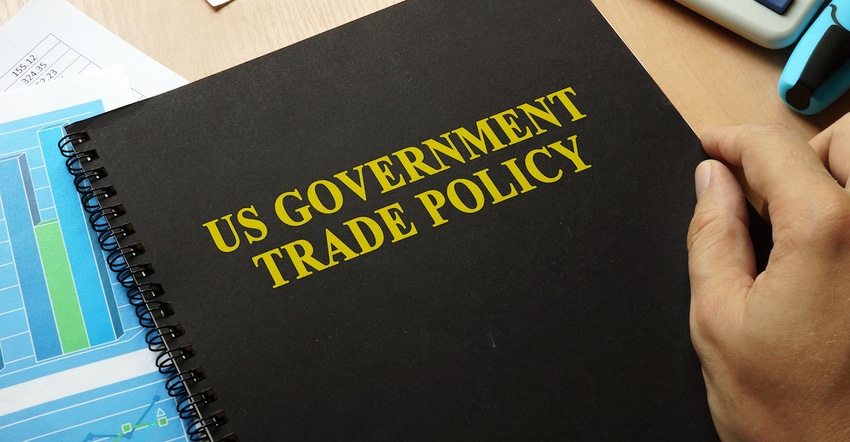
U.S. Trade Representative Katherine Tai met virtually Monday with U.S. agriculture organizations to discuss the Biden-Harris administration’s trade agenda and to hear from the organization’s on specific trade priorities.
Meetings were held with the Florida Fruit and Vegetable Association, National Potato Council, National Milk Producers Federation and the Northwest Horticultural Council. The Ambassador expressed her desire to support U.S. agriculture producers in a worker-centered trade policy and she committed to staying in close communication, according to a readout from USTR.
Jim Mulhern, NMPF president and CEO, and NMPF’s Chairman Randy Mooney offered to closely collaborate with Tai and the entire Biden administration on trade in order to strengthen the health of the U.S. dairy industry to allow for further expansion of the hundreds of thousands of dairy-reliant jobs across the country.
“From farmers to farm workers, dairy manufacturers, milk haulers and port workers – all these are just some of the Americans that are increasingly reliant on dairy exports for their prosperity,” Mulhern says. “Expanding access for Made-In-America dairy products and eliminating the non-tariff trade barriers that impede them is fundamental to supporting the U.S. dairy industry and the millions more who depend on a robust dairy supply chain.”
In the meeting with Tai, Mulhern emphasized the need for new market opportunities, noting in particular the importance of enforcement of existing trade agreements such as ensuring Canada meets its trade obligations; countering European Union attempts to misuse common food names through inappropriate geographical indication rules; engaging with Mexico to ensure a normal flow of trade; and concluding new market expanding trade agreements.
“We’re grateful to Ambassador Tai for taking the time to meet with us and discuss a few of the trade-related issues on the minds of America’s dairy farmers,” says Mulhern. “Our industry is an agricultural leader in improving sustainability, promoting high animal care standards, and providing high quality products. Together with the U.S. Dairy Export Council we’re eager to work closely with the Ambassador and her team to meet growing global dairy demand with sustainably produced American dairy products.”
Geographical indications
The Consortium for Common Food Names, NMPF and USDEC commended Tai and U.S. Trade Representative Office staff, as well as USDA and other administration partners, for reaffirming in its recent Special 301 Report the U.S. government’s commitment to tackling continued European Union misuse of legitimate geographical indications protections.
USTR’s Special 301 Report, an annual publication tallying global challenges pertaining to intellectual property issues, called out the EU’s policy of blocking fair competition through the pursuit of geographical indications restricting the use of common food and beverage terms, which erect barriers to trade in products relying on common food names.
A summary from USTR says concerns with the European Union’s aggressive promotion of its exclusionary geographical indications policies persist. “The United States continues its intensive engagement in promoting and protecting access to foreign markets for U.S. exporters of products that are identified by common names or otherwise marketed under previously registered trademarks,” USTR notes. “As part of its trade agreement negotiations, the EU pressures trading partners to prevent all producers, other than in certain EU regions, from using certain product names, such as fontina, gorgonzola, parmesan, asiago, or feta. This is despite the fact that these terms are the common names for products produced in countries around the world.”
CCFN Executive Director Jaime Castaneda comments: “USTR has accurately diagnosed the problem. Now the task before the U.S. is to take the necessary steps to effectively curb this scourge to U.S. food and agricultural producers. The EU’s GI policy is intentionally barring competition from a host of other suppliers that all simply seek a level playing field including small and medium-sized family-owned companies, farmer-owned cooperatives, producers in developing countries and other actors throughout the supply chain that bear the brunt of these harmful restrictions. The U.S. must build on past advances to pursue a more proactive and effective path to combating the misuse of GIs by establishing concrete market access protections for the use of widely used terms.”
Last year more than 170 members of Congress urged an expansion of the trade toolkit the U.S. deploys to deal with geographical indications that block the use of common food names, says Mulhern. “It’s time to put that into practice and secure affirmative protections for the key common terms on which U.S. cheesemakers and other food producers rely,” he adds.
CCFN filed extensive comments with USTR outlining GI-related developments, foreign governments’ roles in driving those policies and the impacts on U.S. farmers and food producers. NMPF and USDEC also submitted comments supporting CCFN’s global overview and the need for a more robust U.S. trade policy approach to tackling GI abuses.
About the Author(s)
You May Also Like






